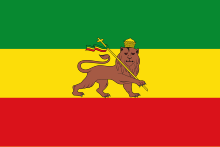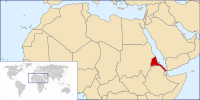Portal:Eritrea
The Eritrea Portal
Eritrea (/ˌɛrɪˈtriːə/ ERR-ih-TREE-ə or /-ˈtreɪ-/ -TRAY-; Tigrinya: ኤርትራ, romanized: Ertra, Arabic: إريتريا, romanized: Erytrya pronounced [ʔer(ɨ)trä] ), officially the State of Eritrea, is a country in the Horn of Africa region of Eastern Africa, with its capital and largest city being Asmara. It is bordered by Ethiopia in the south, Sudan in the west, and Djibouti in the southeast. The northeastern and eastern parts of Eritrea have an extensive coastline along the Red Sea. The nation has a total area of approximately 117,600 km2 (45,406 sq mi), and includes the Dahlak Archipelago and several of the Hanish Islands. Human remains found in Eritrea have been dated to 1 million years old and anthropological research indicates that the area may contain significant records related to the evolution of humans. The Kingdom of Aksum, covering much of modern-day Eritrea and northern Ethiopia, was established during the first or second century AD. It adopted Christianity around the middle of the fourth century. Beginning in the 12th century, the Ethiopian Zagwe and Solomonid dynasties held sway to a fluctuating extent over the entire plateau and the Red Sea coast. Eritrea's central highlands, known as Mereb Melash ("Beyond the Mereb"), were the northern frontier region of the Ethiopian kingdoms and were ruled by a governor titled the Bahri Negasi ("lord of the sea"). In the 16th century, the Ottomans conquered the Eritrean coastline, then in May 1865 much of the coastal lowlands came under the rule of the Khedivate of Egypt, until it was transferred to Italy in February 1885. Beginning in 1885–1890, Italian troops systematically spread out from Massawa toward the highlands, eventually resulting in the formation of the colony of Italian Eritrea in 1889, establishing the present-day boundaries of the country. Italian rule continued until 1942 when Eritrea was placed under British Military Administration during World War II; following a UN General Assembly decision in 1952, Eritrea would govern itself with a local Eritrean parliament, but for foreign affairs and defense, it would enter into a federal status with Ethiopia for ten years. However, in 1962, the government of Ethiopia annulled the Eritrean parliament and formally annexed Eritrea. The Eritrean secessionist movement organised the Eritrean Liberation Front in 1961 and fought the Eritrean War of Independence until Eritrea gained de facto independence in 1991. Eritrea gained de jure independence in 1993 after an independence referendum. Eritrea is one of the least developed countries. It is a unitary one-party presidential republic in which national legislative and presidential elections have never been held. Isaias Afwerki has served as president since its official independence in 1993. According to Human Rights Watch, the Eritrean government's human rights record is among the worst in the world. The Eritrean government has dismissed these allegations as politically motivated. Freedom of the press in Eritrea is extremely limited; the Press Freedom Index consistently ranks it as one of the least free countries. As of 2022 Reporters Without Borders considers the country to be among those with the least press freedom. Eritrea is a member of the African Union, the United Nations, and the Intergovernmental Authority on Development, and is an observer state in the Arab League alongside Brazil and Venezuela. (Full article...) Selected article - Italian Eritrea (Italian: Colonia Eritrea, "Colony of Eritrea") was a colony of the Kingdom of Italy in the territory of present-day Eritrea. The first Italian establishment in the area was the purchase of Assab by the Rubattino Shipping Company in 1869, which came under government control in 1882. Occupation of Massawa in 1885 and the subsequent expansion of territory would gradually engulf the region and in 1889 the Ethiopian Empire recognized the Italian possession in the Treaty of Wuchale. In 1890 the Colony of Eritrea was officially founded. In 1936 the region was integrated into Italian East Africa as the Eritrea Governorate. This would last until Italy's loss of the region in 1941, during the East African campaign of World War II. Italian Eritrea then came under British military administration, which in 1951 fell under United Nations supervision. In September 1952 it became an autonomous part of Ethiopia, until its independence in 1991. (Full article...) Selected picture -Did you know -
CategoriesRelated portalsWikiProjectsGeneral images - Topics in EritreaSelected panorama -Associated WikimediaThe following Wikimedia Foundation sister projects provide more on this subject:
SourcesDiscover Wikipedia using portals | |||||













































